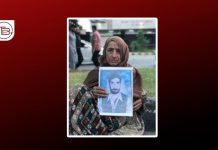Author: Hakeem Wadhela
I will avoid any discussion on Balochistan’s seventy-year relationship with Pakistan, the executed military operations, the false promises with the Baloch leaders and countless martyrdoms of the Baloch sons; I will draw attention to the ongoing predicaments that Balochistan has been burdened by in 2020.
2020 is proving to be a tough year for humans all over the world. This year, the nuclear powers of the world understood that atomic bombs and billion-dollar espionage cannot ensure humanity’s survival; but that the efficient utilization of the scientific experiments is the only real source of progress.
If the billions of dollars squandered in atomic bombs had been invested in the life-giving medical field, the ambitious humans – aiming to conquer mars – would not have needed to think twice before setting a foot outside their homes.
When the world is striving to find a cure for the Covid-19, an incident took place in Turbat on the eve of 26 May that left an indelible mark on Balochistan’s history. Resisting the dacoits to the death and saving the life of her young daughter, Bramsh, Malik Naz resuscitated the courageous, audacious and the brave characters of the countless parables of the Baloch history.
On 26 May, the #BlackLivesMatter trend was trending on all the major social media platforms in the world. Simultaneously, the Baloch initiated an online campaign by name of #JusticeForBramsh against the Dannuk incident and demanded justice for the four-year-old Bramsh Baloch.
The viral #JusticeForBramsh campaign reached another city, known to the Punjabis only as the place where the CPEC route runs, where Gwadar Port is being built and the CPEC that will benefit the entire Pakistan – Gwadar. But they are unaware that Gwadar is inhabited by living souls, and that the inhabitants can talk, scream or take to the streets for their rights.
A spark originated in Gwadar when an elderly Baloch addressed the culprits of the Dannuk incident and vowed in a diatribe that Balochistan will not rest until justice has been delivered to Bramsh.
The protests started from Gwadar and spread across the Balochistan like a wildfire. The fear that had been installed in Balochistan by the state actors and the death squads dissipated and Balochistan increased the ambit of its demands and pin-pointed the predicaments that had been inflicted on it.
One of these predicaments is the death squads that have been allegedly established by the state and are working under its patronage – the ongoing protests aim to efface these state-backed death squads from Balochistan. The blatant and unhindered drug trafficking, the official ban on political activities and the inaccessibility of the internet throughout Balochistan are other major predicaments that require an immediate solution. These issues are compounded by the ongoing protests of the Baloch students against the online classes.
Protests are being carried out throughout Balochistan in the form of an unbroken chain. Amid these protests, the families of the Baloch missing persons organized another protest to mark the 11th year of the student-leader Zakir Majeed’s disappearance and to commemorate the Baloch Missing Persons Day on 8 June in Quetta. Like innumerable other protests, this could also have been forgotten within days if Haseeba Qambrani’s heart-wrenching video – where she appeals for the recovery of her brothers and other Baloch missing persons in a sobbing, shaky voice – had not surfaced. Owing to this video, at least one of the families of the countess Baloch missing persons was summoned to meet the Pakistani prime minister.
However, while the protests for Dannuk incident were underway another incident unfolded in Dazin Tump, where another woman Kulsoom Baloch was brutally murdered by state-backed goons.
Similarly in the past, many crimes have been perpetrated against women in the form of rape, murder, honour killing and blackmailing. In 2005, a young doctor by the name of Shazia Khalid was brutally raped and tortured in a heavily guarded military facility in a Gas plant in Sui, Dera Bugti. The culprit, a high-ranking military official, Captain Hammad, and his accomplice, Imtiaz, had broken into Dr Khalid’s room at midnight, tied her up with a telephone cord and had raped her all night. When she had sought assistance in the morning in an adjacent hospital, the officials had sedated her and kept her incommunicado for three days. Then, she had been shifted to Karachi and put in two-month house arrest with her husband. Dr Khalid had been threatened not to pursue the case any further.
When the news broke out, the enraged Baloch, headed by the renowned Baloch nationalist Akbar Bugti, resisted against Pakistani state. The Pakistani government, headed by the military dictator Parvez Musharraf, sent thousands of additional troops in the Baloch soil to squelch the uprising. Musharraf even appeared on TV in person and claimed that Captain Hammad was innocent and that this story had been concocted to tarnish the image of the military. Dr Shazia Khalid was insinuated with an indecent profession . She never got justice and was forced to acquire sanctuary in Canada.
In October 2019, another unfortunate incident surfaced in Quetta. In the University of Balochistan, the administration had unlawfully used the security cameras to record the candid movements of students in compromising situations. Then, the administration, including the Vice-Chancellor Javed Iqbal, had used these recordings to extort financial and sexual favours from the female students. Some students revealed that they had been blackmailed for over a year.
After the disclosure of the news, protests erupted throughout Balochistan. Students, political organizations and the general public took to the streets, boycotted university and demanded the termination of the incumbent administration. Javed Iqbal was temporarily suspended, security cameras were removed and the university was heavily manned. The news of the incident spread like wildfire throughout Balochistan. Many families summoned their children back home, abandoning their education. The already abysmal educational environment of Balochistan was aggravated by this incident and resultantly, female education received such a heavy blow that it might not recuperate for years.
This short list of predicaments will suffice for the advertisers of peace and safety in Balochistan. However, these are not even one per cent of Balochistan’s serious troubles.
Disclaimer: The views and opinions expressed in this article are those of the author and do not necessarily reflect the official policy or position of The Balochistan Post or any of its editors.






























